Becoming more self-sufficient, Saving money as well as survival, Grow it yourself, Homemade compost, Use renewable natural resources, Store it, Use and reuse
From Just Plain Marie.
“Save Money with Increased Self-Sufficiency
Becoming more self-sufficient can help you save money in so many different ways. Perhaps the original driving force behind becoming more self-reliant wasn’t money, but once you start developing skills and independence, it just might become a pleasant side effect.
Of course there are so many different ways to increase your self-sufficiency, and most of these aren’t going to happen overnight. But let’s take at five things that your great-grandparents probably did, and that you can do, too, in order to save money.
Grow It Yourself
This is DIY, except with food!
You can grow your own fruits, vegetables, spices, and herbs. There are a variety of different ways that you can grow your own food, including planting your own vegetable garden, growing non-hybrid vegetables and harvesting your own seeds, and using square foot gardening techniques in order to grow a lot of food in very small spaces.
You don’t need a hundred acres and a team of horses to grow your family’s food.
Want to get even more self-reliant and frugal? Homemade compost and composted manure are fabulously frugal, even if you need to get them from someone else. Just be sure to source your compost and manure locally.
Potatoes and winter squash, in my experience, grow with almost no attention, and a 10 pound bag of seed potatoes can easily become a hundred pounds or more of storage potatoes in your root cellar! The frugal way is to plant the potatoes that sprout over the winter.
Did you know that you can get varieties of many fruit trees that can grow in a large planter pot? What’s more frugal and self-reliant than an apple tree? Well, an orchard, to be honest. The best time to plant a tree was twenty years ago. The second best time is always ‘today’.
Frugal gardeners don’t like being bound to short growing seasons. Build a greenhouse, or pick up a kit that lets you put one together quickly.
Go Au Naturel
No, no, no – leave your clothes on. That’s not what I meant.
There are SO many ways that you can use renewable, natural resources in order to be more self-sufficient AND save a boatload of money.
Do you heat with wood? (If you can, you should.) Instead of buying split wood, buy it in chunks or even logs and split it yourself. As a comparison, we can buy 8′ lengths of hardwood logs for about $100 per cord. Split wood that is ready to age, though, is well over $300 per cord, and aged firewood – I don’t even want to ask anyone.
How about water? I realize that there are some areas where rainwater harvesting is restricted for a variety of reasons. (Just as not everyone is about to burn firewood) But if you CAN harvest your own rainwater, do it! Rainwater is great for watering your garden. That’s a common bit of advice. What you might not know, though, is that rainwater is soft water and therefore fabulous for washing your hair and for cooking dried beans! Just make sure you filter the water well if you’re using it for beans.
And then there is … the sun! It’s funny how often we ignore it because the sun is one of the best ways to increase your self-sufficiency in so many different ways. The most obvious, in my opinion, are solar panels.”
“Store It
There’s no sense going to the work of growing all of that food unless you know how to store it. If it’s possible, consider building a root cellar.
Learning to can foods means that you can preserve a lot of what you grow or cook and enjoy it all year.
Use and Reuse
You’ve probably heard that slogan from World War II – Use it up, wear it out, make it do or do without. When you use and reuse whatever you can as much as possible, you reduce waste and find new and creative ways to do things. Not only does this increase your self-sufficiency, but it will save you a lot of money.
There are many ways that you can become more self-sufficient. Be conscious of alternative techniques to improve your health and well being, your impact on the environment, and your wallet, and you may find other ways to increase your self-reliance as well.”
Read more:
https://www.justplainmarie.ca/save-money-by-becoming-more-self-reliant/
About The Author
“Marie has homesteaded in the city, in an off-grid cabin in the deep woods, and now in a 130-year old house in a village near her hometown. She is the author of A Cabin Full of Food, available on Amazon and loves to interact with her community on Facebook.”




